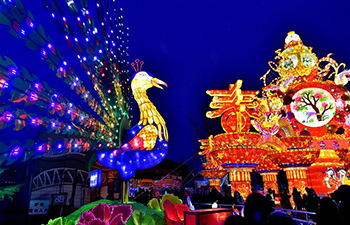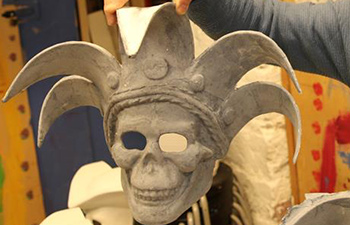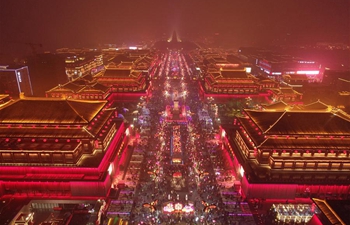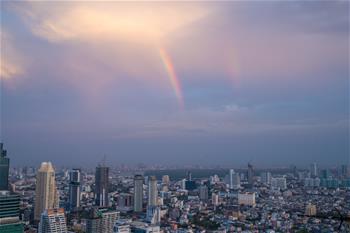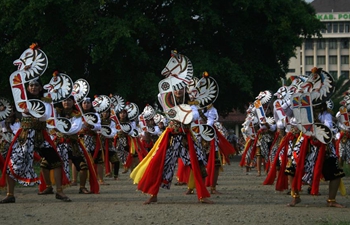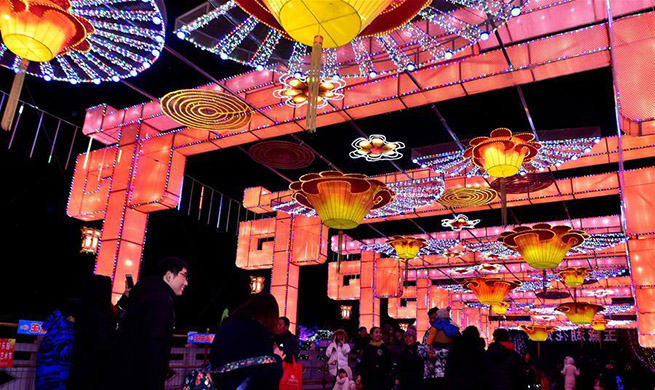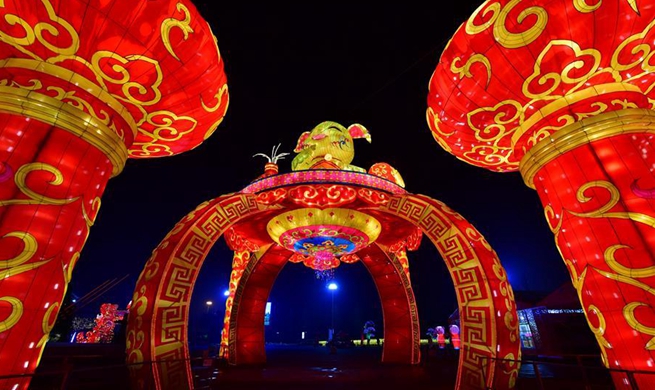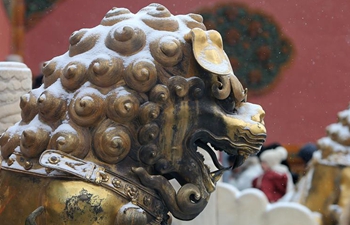BEIJING, Feb. 19 (Xinhua) -- Tickets for the Palace Museum's first night events of the Lantern Festival celebration were quickly booked up after online booking opened Sunday.
Usually falling on the 15th day of the first month in the Chinese lunar calendar, this year's Lantern Festival falls Tuesday. It marks the final day of traditional Chinese New Year celebrations.
The Palace Museum plans to hold two night-tours on Tuesday and Wednesday, displaying some of the most well-known ancient Chinese paintings on its city walls. The Forbidden City has also been decorated with large royal lanterns and shown live folk music performances to give visitors a feel of what it was like to usher in the new year in the royal court 200 years ago.
Since the evening tours are the first-ever event at night for the past 94 years, tickets are in high demand. The events have quickly become one of the hottest topics on Sina Weibo, a popular social media platform.
Tickets for the night tours were free but limited. Some missed the rare opportunity and tried for scalped tickets online and called for the extension of the event.
ENJOY THE LARGEST FULL MOON
The history of the Lantern Festival dates back to the Western Han Dynasty (206 B.C.-25 A.D.), but did not become an important folk festival until the Three Kingdoms period (220-280).
As the festival also marks the first full moon of the new lunar year, people usually go out to enjoy the moon.
Experts forecast that the moon will reach perigee, the closest point in its orbit to Earth on Tuesday, and its surface will be 100 percent illuminated by the Sun, creating the largest, roundest and brightest full moon of the year.
Zhao Zhiheng, an astronomist, said that viewers in eastern China were expected to see a bright and clear full moon just as it rises at around 6:30 p.m. on Tuesday. To view the roundest supermoon, people are suggested to look high in the southern sky at 11:54 p.m.
Photographers across the country will be eager for a perfect photo of the moon on Tuesday night.
LANTERNS LIGHTEN UP SKY
There are many different stories about the origin of the festival. One story goes that during the Han Dynasty, after learning that Buddhist monks would light lanterns to worship Buddha on the 15th day of the first lunar month, the ruler followed suit, ordering all citizens to light lanterns in a similar fashion.
"In ancient times, the festival has also been considered a romantic day," said You Guoqing, a folklore expert. "Girls used to grow up at home and were hardly allowed to go outside to meet people. However, the Lantern Festival was a good chance, as they could leave their home to celebrate and meet young men at the lantern shows."
The custom of hanging colorful lanterns and organizing lantern shows has been handed down for many years. Lantern shows have become an important part of the Chinese New Year celebrations.
In Beijing, at least 19 lantern shows and cultural events including the Palace Museum's night tours will be hosted in public parks, squares and tourist attractions.
Lit up by more than 1,000 lanterns during Spring Festival, Yanglingqing, an ancient town in north China's Tianjin Municipality, has been crowded with visitors taking part in diverse traditional folk activities such as temple fairs.
Performers have brought folk music performances and traditional cultural handicraft exhibitions to the city of Shenyang, capital of northeastern Liaoning Province.
In an interactive section with after the performances, children were invited to play with shadow puppets, wear Korean ethnic masks and do paper cutting.
A local resident, surnamed Zhang, took his six-year-old son to watch the performances and took part in the activities. "All of them are so exciting," his son said.
Apart from the jubilation of the cities, a remote town in Inner Mongolia Autonomous Region has seen dazzling lanterns. To celebrate the Lantern Festival, over 200 lanterns shaped like calabashes, pumpkin, gold ingot and palace lanterns have shed light on the dark sky.
The lanterns are all made by locals who work for a local lantern factory, some from impoverished households. The smallest lantern is smaller than a fist, while the biggest is 2.2 meters in height. Visitors are allowed to write down their wishes on the biggest lantern's cover.
"The elders used to make small red paper lanterns for us during Spring Festival when I was little. But they broke easily," said Du Xuelong, who runs the lantern factory.
"Customers now have more requirements for quality and style. My plant has been making efforts to improve and enhance innovation," said Du, whose plant has sold products to Malaysia, Japan and the Republic of Korea.
TANGYUAN OR YUANXIAO
Most Chinese usually eat yuanxiao or tangyuan on the Lantern Festival. The word tangyuan is nearly the same as tuanyuan, which means reunion in Chinese, making the food a symbol of families coming together.
The snack is a type of sweetened dumpling made of glutinous rice flour and stuffed with a variety of fillings. But many believe yuanxiao and tangyuan are different, based on the making process and fillings.
Roughly speaking, in the southern regions, with eastern provinces of Jiangsu and Zhejiang as the center, tangyuan are kneaded by hand with fillings such as sugar and sesame. While in the northern regions, with Beijing in the center, yuanxiao is rolled in a flat basket and the fillings are often solid fillings, according to Luo Shuwei, a historian and researcher with Tianjin Academy of Social Sciences.
The earliest tangyuan can be traced back to the Song Dynasty (960-1279) in Ningbo, Zhejiang. Families used sugar, sesame and lard to make the fillings.
Nowadays, the classic fillings of yuanxiao or tangyuan is still sugar and sesame, however, varieties have been diversified with more choices for customers, such as nuts, bean paste, fruit, chocolate, yogurt and pepper.
"Regardless of the differences, it is an auspicious custom, representing family reunions, harmony, happiness and good health. Therefore, the custom can be handed down for generations," Luo said.




